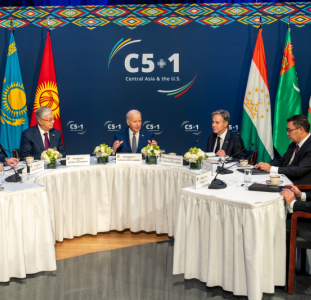Serbia put its armed forces on full alert yesterday after Kosovo special force police-units entered predominantly Serbian-populated villages in northern Kosovo and arrested 23 people, including one Russian national working for the United Nations Interim Administration Mission in Kosovo (UNMIK). Kosovo president Hashim Thaci said that the Russian citizen in question, Mikhail Krasnoshchenkov, “was camouflaged under a diplomatic veil to hamper the police operation.” Prime Minister Ramush Haradinaj claimed that the police-operation was intended to target smuggling and organized crime, and urged Kosovo’s ethnic Serb minority to remain calm and support the police.
In explaining his government’s decision to go to a state of military alert to the Serbian parliament, Serbian president Alexander Vucic said that video-evidence showed Kosovo police firing live ammunition over the heads of civilians during the operation, and that Serbia “will try to preserve peace and stability, but will be fully ready to protect our people at the shortest notice… If this doesn’t stop immediately, there is no doubt how Serbia will react.”
Serbian government official Marko Djuric said the Kosovo police action was devised to intimidate and expel Serbs from Kosovo, and presented “not only a threat to stability but the most direct threat to peace.”
Serbian troops have been seen moving toward the border with Kosovo, and the state Tanjug news-agency stated that a Serbian Air Force Mig-29 made a low pass near the border.
One of the things which makes this sequence of events remarkable is that, only the previous day, Vucic had told Parliament that Serbs needed to accept the reality that Serbia does not control Kosovo, and must seek a compromise in order to normalize relations with Pristina. “We need to recognize that we have been defeated. We lost the territory….We have two options – to normalize relations by reaching an agreement or to maintain a frozen conflict,” he had said in an unusually blunt speech to a special parliamentary session dedicated to Kosovo.
So why would the government of Kosovo engage in such a provocative action only the day after Vucic had made such a speech?
We may rest assured that Thaci does nothing until NATO Headquarters in Brussels greenlights it.
All of this should be interpreted in the context of Vucic’s attempts to maintain a moderate position in relation to Kosovo, but also in the wider context of the question of Serbia’s geo-strategic alignment. While Vucic’s government has not recognized Kosovo’s status as an independent country, he has nonetheless attempted to normalize relations with Pristina. Also, while Vucic is in favour of Serbia joining the EU, Serbia nonetheless remains a Russian ally, and has also engaged more closely with China in recent years. Vucic has always been vehemently opposed to the idea of Serbia joining NATO. During the same speech to parliament on May 27th, Vucic had thanked President Putin for his help on the Kosovo-issue, and for Russia’s assistance in opposing economic sanctions against Serbia.
The EU sponsored talks between Vucic and Thaci in Brussels last November, but no progress was made. Relations between Belgrade and Pristina further deteriorated after the Kosovo government subsequently slapped a 100% tariff on Serbian imports. This tariff may very well have been a pretext for yesterday’s provocative security-operation, the ostensible purpose of which was to crack down on “smuggling.”
Russia’s role as a broker may very well be one of the factors precipitating yesterday’s provocation. Vucic finds himself in the difficult position of many heads of state who geo-politically try to “sit on two stools”
– this balancing-act never seems to satisfy Brussels or Washington. These events have taken place against the recent background of abortive attempts to instigate a colour-revolution in Serbia. Yesterday’s security-operations in Kosovo may have been calculated in order to be a game-changer, to counter Russia’s attempts to manoeuvre into the brokerage-role, and also as an attempt to destabilize Vucic’s government by making his moderate positions on Kosovo and on broader geo-political questions untenable.
All in all, the sequence of recent events in Serbia makes it extremely difficult to avoid the conclusion that, by one means or another, there is a concerted project to destabilize the Vucic-government. Populist protests, mobilized by both nationalists and liberals (the combination of nationalists with liberals is a textbook “colour-revolution” strategy), gradually took a violent turn in recent months, but the Serbian government weathered that crisis.
Then on Monday, Vucic makes his speech to parliament which, although not recognizing Kosovo’s independence, makes it clear that a normalization of relations and meaningful dialogue are the only tenable ways forward. The very next day, the Pristina government launches a security-operation, on the pretext of combating smuggling and organized crime, which severely destabilizes predominantly Serbian-populated areas in northern Kosovo.
The very next day….
In response, Vucic has no choice but to emphasize his government’s preparedness to protect ethnically Serbian civilians if necessary. In view of Vucic’s attempts to maintain a moderate position, both on Kosovo and on the question of Serbia’s overall state of geo-political alignment, it really couldn’t be any clearer that a multi-levelled attempt is being made to put him in an impossible position.
But by whom?
Thaci does nothing alone.









